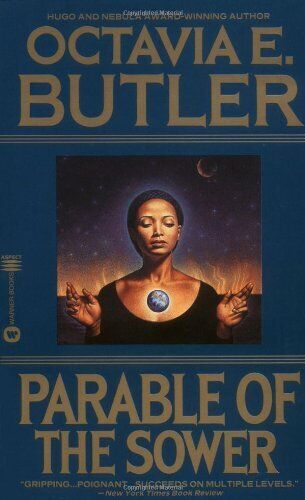
I have a massive to-be-read (TBR) pile of books. In fact, it’s not just a pile, as I often joke, it’s an entire library on its own.
So I don’t hanker after the latest releases, not when I know that I have so many of my old books that I’m yet to read.
Last year, I dug into my bookcase and pulled out Kindred by Octavia Butler. I knew it drew on the theme of slavery in the US and was expecting not to enjoy it. I did, although parts were quite disturbing, so maybe “enjoy” is not the most appropriate word to use. It left a strong impression with me and I picked it up easily and without hesitation as I knew it would immediately transport me into another world and the pages would fly.
It took me almost exactly another year to start another book by Octavia Butler. This time it was Parable of the Sower. I bought the sequel, Parable of the Talents when I still lived in the U.S. (so, well over 17 years ago) and of course I haven’t read it yet. When I discovered there was another book that came before, it made sense to read that one first.
Before I started, I read a mini-review on Instagram, where Parable of the Sower was described as “harrowing.” I don’t know about you, but in these uncertain times we are in – with COVID-19, it’s uncountable strains, the Russian-Ukraine war, Nigeria’s economy being in the toilet, the insecurity, the near-total lack of electricity, the floods that have affected about 31 of the country’s 36 states, the food shortage caused by climate change and insecurity that has caused food prices to leap into the stratosphere and a hundred million other things you often prefers not to think about – I prefer to read books that bring me joy. I don’t want to be “harrowed” anymore than I already feel on most days.
But some books call you and so I started Parable of the Sower. It started with a grim description of life in a United States of America where law and order has totally broken down and violence is everywhere, jobs that pay cash money are almost impossible to find unless you have a degree – and even those are rare. For everyone else who can get it, the few available jobs offer meagre food and board not money. Otherwise, you work the land, eat what you grow and sell some. The worst option, which most people have to do anyway, is to scavenge the dead and strip their bodies of anything that could be useful, such as their money, weapons, shoes, clothes. Climate change has made water scarce. Large bodies of water are almost or completely dried-up.
Close to half of the American population can’t read or write, because education is too expensive. God-like leaders start to emerge, taking advantage of the vast numbers of hungry and disillusioned people who are desperate for a better life. And of course, slavery (selling human beings for money) is normal practice.
And the worst part of reading this book was that these horrors aren’t too far-fetched at all. Some of it is happening already, while we are well on the way to some others. The book starts in the year 2023. That’s next year! Of course, this book was published in 1993 and maybe it felt that this was a distant enough future, but time has an unfailingly surprising habit of moving quicker than we imagine it could.
And here we are now in 2022, in a world where we are daily bombarded with bad news at such an intensity that it takes brute cheerfulness, illogical hope or naivete to smile through it and plan for a brighter future.
Books like these serve as a wake-up call to us all on how terrible things could end-up being for us, if we don’t make some determined and altruistic changes. But how many people are reading books like this, or any books at all in the first place?
The most shocking thing was when I read the first few pages of the sequel Parable of the Talents – a book published in 1998 – about a politician who has promised to “make America great again.”
It serves as a reminder that there is nothing new on this earth. And maybe these politicians do read these type of books after all.

Recent Comments